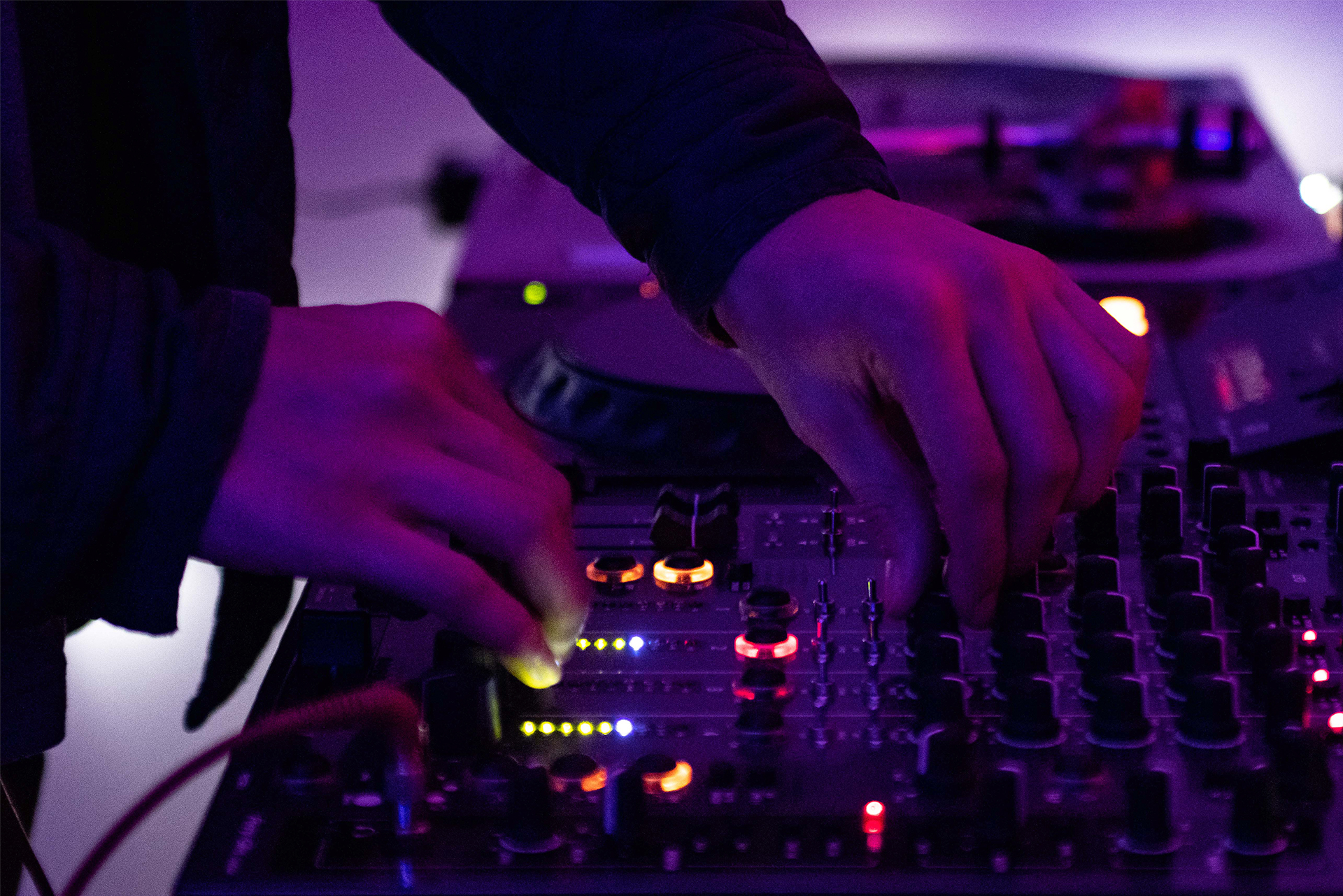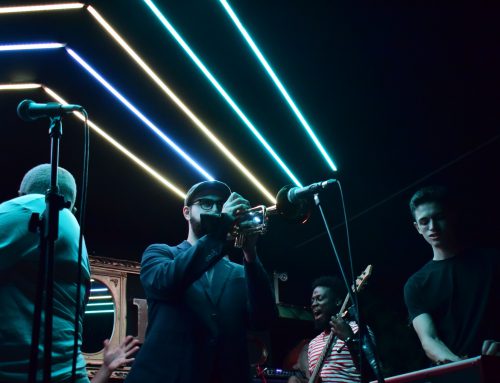BY Esteban Cuevas & Dominic De Meester
“It made me feel like people are still fighting for the old days.”
This is how Arnaud Robic Myara, Montrealer and great fan of electronic music and the nightlife, felt after attending his first virtual concert.
Despite the pandemic, around 50 people attended a party in early February. Four Montreal based DJs prepared long playlists of dance electronic music so attendees could let loose. The difference with a normal show is that all participants, including the DJs, were live streaming from their homes. Fans could be seen dancing, exercising, cooking and eating or simply listening and enjoying the show.
“You can tell people are not going to stop playing music. People still want to party. People still want to get together,” says Myara.
Concerts and other live music shows have been forbidden since the start of lockdown measures in March 2020. Since then, Montreal’s music scene has found other ways to connect with their audiences and to remain active despite the strict social distancing measures. Among those, several artists have decided to start doing live shows online.
Max Honigmann hosted the party. He is a Montreal-based DJ, music producer, event organizer and member of Inner Circle Montreal—host of the online party. The collective organized the party as a fundraiser for the Native Women’s Shelter of Montreal.
“It’s not nearly as good. Not even close to the same thing. But it’s the best thing we have,” he says.
Inner Circle Montreal is a non-profit collective that promotes underground dance music. It was founded in 2017 and is composed of five members. Until the pandemic hit, they used to organize dance parties in venues across the city. The collective was planning a few shows that were to take place in March. Due to the sudden cancellations, their first live show was streamed on Facebook.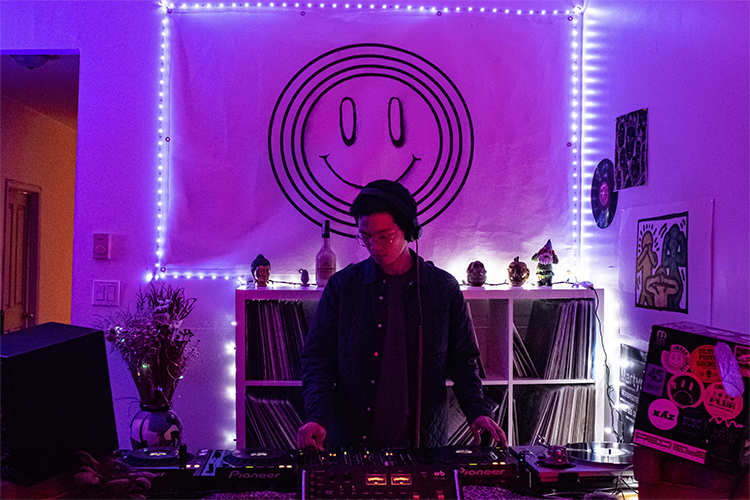
Jean Philippe Mêtivier (DJ Mêtis), one of the five members of Inner Circle Montreal, prepares to play for a digital party from his own apartment. The show was live streamed. Photo by Esteban Cuevas.
“One of the main psychological components of COVID is that you’re at home all the time. A lot of people are working from home and every day starts to feel the same,” says Honigmann, explaining that for the collective and their followers, the events are a way to escape the monotony of months of lockdown.
“I mean, at the end of the day, people always want music. People always want to connect with the music scene. DJs always want to play for an audience,” he adds. “So it’s a way to kind of achieve those goals while respecting laws and keeping people safe.”
For music lovers like Myara, who haven’t been to a regular show for nearly a year, a digital show is the closest they’ll come to the real thing and a way to break the routine. Even if it comes with mixed feelings.
“There’s not a one day that I don’t think about [the nightclub where I work], my favourite bar in Montreal or the people like the DJs,” he says. “It feels good to see people make music. We felt good [seeing] people dance but it was bittersweet because this type of environment needs to be physical, you know?”
It’s no surprise that the pandemic has hurt Quebec’s artists. Despite the financial help given by the government like the Conseil des Arts et des Lettres du Québec (CALQ) Cultural Sector Economic Recovery Plan and the CERB plan, it has not been enough for many.
According to a survey made among the unionized members of the Guilde de Musiciens et Musiciennes of Québec (GMMQ), around half of those who answered the survey are facing financial hardships and had to seek work outside of the music industry. More than half of those surveyed think the pandemic may force them to lay down their instruments. While not everyone has been fortunate enough to continue producing music, some have used online concerts as a way to keep active.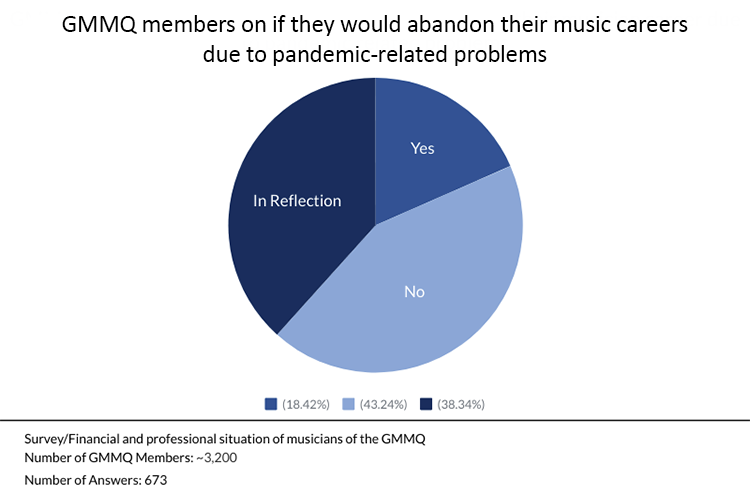
The pandemic has made some musicians rethink their passion. Infographic by Esteban Cuevas.
“Watching a show on the laptop is not the greatest. But the stats have been impressive,” says Luc Fortin, President of the GMMQ, on ticket sales for some digital shows. “Unfortunately, it’s not every musician that can work in these shows. But at least there is some activity.”
The GMMQ has nearly 3,200 members and establishes minimum working conditions for musicians. One of the rights they were able to get is the possibility to maintain some activities for their members.
“We have the right to record an album. Even with curfew hours, we still have the right to record shows. It’s a little exception that’s well appreciated by our members,” said Fortin.
Radium Moon launches a new album during the COVID-19 pandemic. Video by Dominic de Meester.
Independent artists, unions and record labels have turned to digital options to continue being part of the industry. But, while there is a hope to make profits out of it like before the pandemic, money is often not the motivator.
“We’re trying to develop the artists’ careers. We’re not necessarily trying to make bank right now. Which is good because we’re not,” says Matt Collyer, label manager of Stomp Records and band leader of The Planet Smashers. The Montreal-based music management company develops the career of many ska, punk and rock-n-roll bands and has organized more than a dozen digital shows.
He explains that their digital shows often break even or make no significant profit for the record label. Still, he sees it as an opportunity to continue reaching out to the band’s fanbase, recruit new fans and motivate their artists to continue to work on their craft. At the same time, they are preparing for when lockdown restrictions will loosen and touring, a critical source of revenue for the company, will be allowed.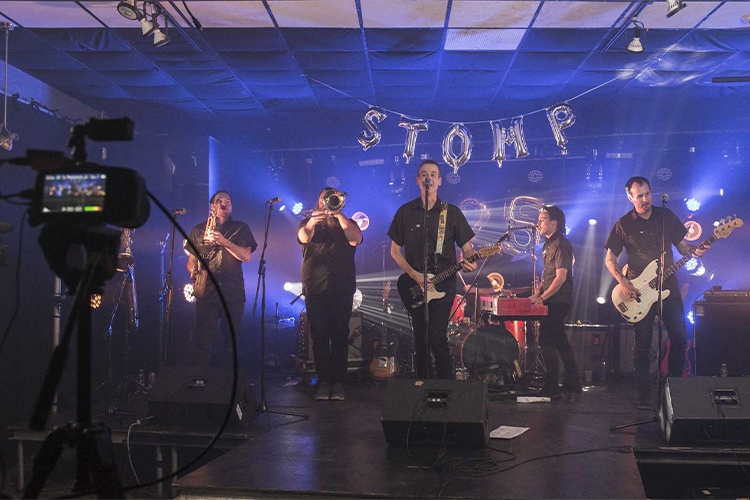
Matt Collyer’s band, The Planet Smashers, playing at Montreal’s Club Soda for the Stomp Records 20th Anniversary on Friday, October 23rd, 2015. Collyer explains that band revenues come mostly from live shows and touring. Photo courtesy of Stomp Records.
“No one wanted to do [online shows] at first but then, over time as COVID continued, we realized that we probably should embrace this a little more proactively,” says Collyer.
Digital performances come with their own set of problems. For the Inner Circle Montreal collective, the livestream has been stopped on a couple of occasions, due to copyright crackdown by streaming service Twitch. Honigmann explains that, as DJs, often they will play other people’s music. Other issues, like a stream cutting out during a concert, forced them to try different services and work on a better setup.
Collyer believes it is inadvisable to put on too many shows, in order for them to remain interesting. He explains that the “appetite” for online shows is limited as it does not replace the in-person experience. Variety and the frequency of the shows are something to keep in mind. Still, he recommends people to try them.
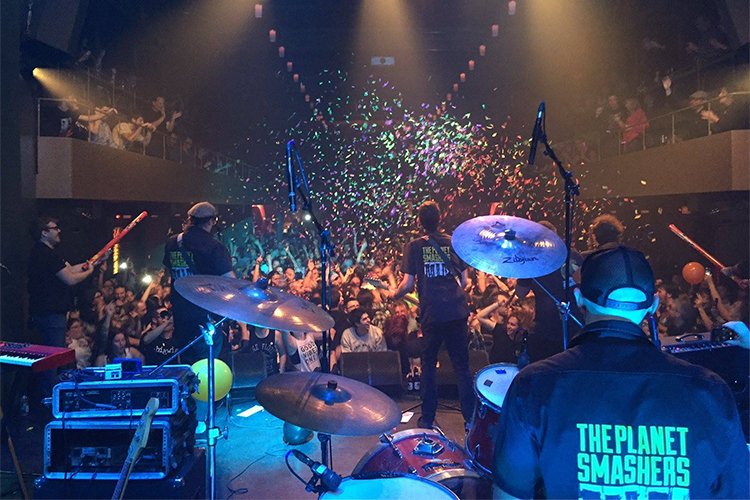
Matt Collyer (centre) and his band, The Planet Smashers, playing during a virtual show part of their livestream series. The event took place at Quebec’s L’ANTI Bar in December, 2020. Photo courtesy of Alexandre Charron.
“Originally, I thought they would be boring, and crappy to watch as a fan. But then I did want to watch and I was like, ‘holy cow,’” he says. From his experience, the production quality has improved.
“I would say try one if you haven’t done one yet, go take a look at one of these online shows,” he adds. “They’re way more entertaining than watching Netflix.”
While fans still long for live shows, there is, at least for the moment, something to keep concert enthusiasts content.
“We make sacrifices now,” said Honigmann. “Once things are safe again to party and to get together, we’re gonna have even more fun than we’ve ever had. So that’s the way I try to look at it.”
